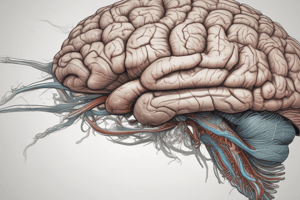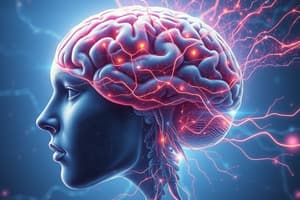Podcast
Questions and Answers
What is the main organ responsible for controlling and coordinating functions throughout the body?
What is the main organ responsible for controlling and coordinating functions throughout the body?
- Brain (correct)
- Liver
- Heart
- Kidney
Which system allows the brain to coordinate responses to stimuli like touch, light, sound, and temperature?
Which system allows the brain to coordinate responses to stimuli like touch, light, sound, and temperature?
- Respiratory System
- Digestive System
- Nervous System (correct)
- Circulatory System
What is the role of hormones in the context of control and coordination in living organisms?
What is the role of hormones in the context of control and coordination in living organisms?
- Storing energy
- Supporting movement
- Generating heat
- Regulating internal processes (correct)
How do nerves contribute to control and coordination in living organisms?
How do nerves contribute to control and coordination in living organisms?
Which function is NOT associated with control and coordination in living organisms?
Which function is NOT associated with control and coordination in living organisms?
What would be the consequence of a lack of control and coordination in living organisms?
What would be the consequence of a lack of control and coordination in living organisms?
Flashcards are hidden until you start studying
Study Notes
Control and Coordination is a fundamental aspect of how living organisms function, from single celled creatures like bacteria to complex multicellular animals. At its most basic level control refers to the regulation of activity within an individual while coordination involves interacting with other individuals. In biological terms this means regulating internal processes such as growth, differentiation, energy production, metabolism, secretion, fluid balance, immune response and repair.
The most important organ involved in controlling and coordinating functions throughout the body is the brain through various nerves. These nerves transmit messages between the brain and spinal cord relaying information to all parts of the body. This communication network allows the brain to coordinate responses to stimuli such as touch, light, sound, temperature and even emotional states. Furthermore, many hormones also play role in transmitting signals around the body allowing it to respond appropriately to changes in external conditions.
In summary control and coordination is essential for life to occur. It allows us to adapt to our environment by sensing and responding to changes in internal and external conditions. Without control and coordination we would not be able to grow, move, think or feel. The principal organs involved in these processes are the brain which coordinates physical activities and emotional state, the spinal cord which sends out electrical impulses to activate muscles and the nerve fibers which send back feedback to the brain about what is happening.
Studying That Suits You
Use AI to generate personalized quizzes and flashcards to suit your learning preferences.




